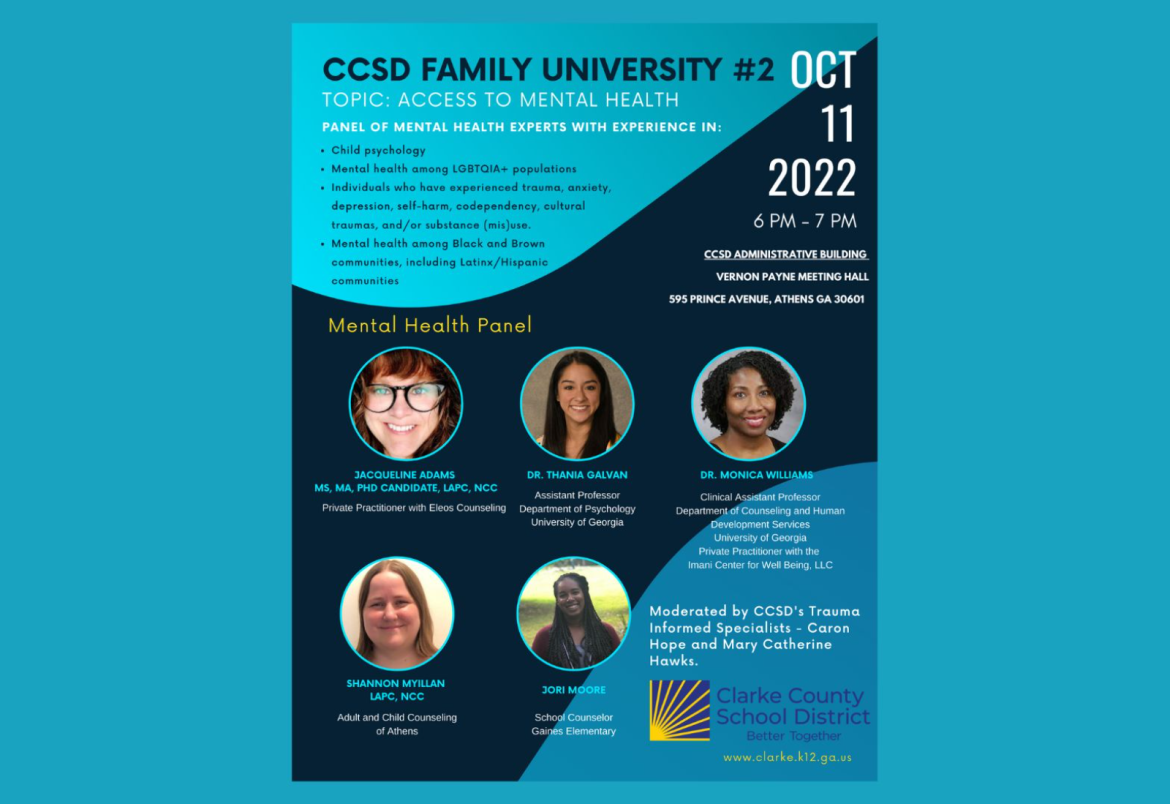An infographic on the Clarke County School District website provides information about CCSD’s Family University, which took place on Oct. 11. University of Georgia student Jessica Evans attended the event for a school project. “(We) had a lot of events we could go into but I picked this one because I was interested in knowing (about) education in the community,” Evans said. “I picked this one because I knew that it’s something that affects my community and I know that it affects a lot of young people in general, so I was just interested to learn more about it.” Graphic courtesy of Clarke County School District’s Family and Community Engagement department
The general public was invited to the CCSD administrative offices building from 6-7 p.m. on Oct. 11 for CCSD’s second Family University event of the year.
Clarke County School District’s Family and Community Engagement department welcomed the public to the CCSD administrative offices building, located at 595 Prince Ave., on Oct. 11 for a Family University session focusing on an “access to mental health.”
The event, which took place from 6-7 p.m., featured a live panel of four mental health experts who talked about issues related but not limited to child psychology, trauma and anxiety. The panelists also discussed mental health stigmas in marginalized groups.
“I liked the panelists. I liked that they had different approaches and different answers and could give different information for the same questions,” University of Georgia student Jessica Evans said. “I (also) liked that it was a diverse group and (they) could (give) different perspectives on that too.”
“Running the private practice I do, trauma is so prevalent now in our clients. I work with a lot of college students who come in with a lot of trauma from childhood (and ACCSA staff therapist Shannon Millan) sees children and so we have lots of children coming into the practice who, as they (described), have been through so much trauma (and) abuse.”
— Jeannie Latimer,
Adult and Child Counseling Service of Athens Director and staff therapist
Adult and Child Counseling Service of Athens Director and staff therapist Jeannie Latimer attended the event in order to further her knowledge about adolescent mental health.
“Running the private practice I do, trauma is so prevalent now in our clients,” Latimer said. “I work with a lot of college students who come in with a lot of trauma from childhood (and ACCSA staff therapist Shannon Millan) sees children and so we have lots of children coming into the practice who, as they (described), have been through so much trauma (and) abuse.”
A 55-minute video of the Clarke County School District Family University event that took place from 6-7 p.m. on Oct. 11 is shown above. Adult and Child Counseling Service of Athens Director and staff therapist Jeannie Latimer attended the event and thought that the mental health panelists advice was beneficial. “The resources that they mentioned (were very helpful). I (was) aware of a lot of them but they mentioned some that I was not aware of,” Latimer said. “Also, hearing from the different perspectives, whether it’s a school counselor or somebody from the (UGA) department of physcology or social work, (was great).” Video fair use of the official CCSD YouTube account
Towards the end of the event, members of the audience were encouraged to ask the panelists questions, and Evans was one of the first people to do so.
“The question I asked was about the Black community and just how a lot of people that are in poverty don’t have access to (resources) that they need. I was asking what is being done to help that,” Evans said. “I guess my reason for asking that was because I’m a minority. I’m Black, so I’m interested in knowing what’s being done to help people.”
While Latimer did not ask a question, she appreciated the solution-oriented approach offered by the panelists.
“These kids can’t get to the services (they need) and usually their only link is their school counselor, (so) I like what (the panelists) said about going out to the churches, to civic community groups, (basically) engage with them where they are,” Latimer said. “I also liked the idea that somebody said (about) making materials that are easy for people to understand, not full of a lot of professional language and doing bilingual posters. Those are some ways to start moving in that direction, but we have a long way to go.”
